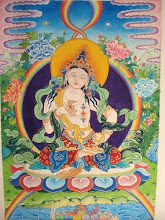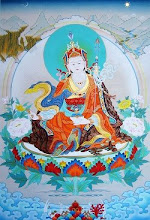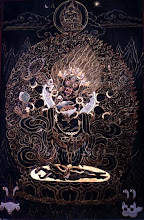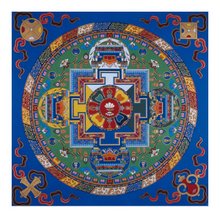He set us up early for anxiety by stressing in his opening orientation that while Westerners tend to make allowances for beginners, Japanese expect perfection from day one. That may seem shocking to some of you. It was to me. But in a sense, he is correct. Japanese are anxious perfectionists. They'll go to great lengths, and worry to extremes, about getting it right – whatever “it” might be. But only the most insensitive parents, teachers, coaches or tutors expect their charges to be perfect from the very start. Japanese do make allowances. What is important is a proper attitude, to have sincere yaruki, to gambaru. It's not so much that you have to get it right the first time; you have to be seen to be making the effort to get it right.
Within the cultural and religious context, though, it wasn't my place to question or argue. Inside a week most of us were sleeping poorly after nights filled with anxiety laden dreams, nightmares in which we found ourselves called on to do something important for which we were not prepared. One of our number appeared to be something of a perfectionist and for a few days could be found walking with head down, snapping at us when communication was necessary. Another was subject to nocturnal communication, verbal manifestations of dreams about some of the stressful situations in which we found ourselves. One night he seemed to be making tea and wanted to know what to with the water. Another night he sat up and gave a self introduction.
The unrealistic level of expectation was exacerbated by an inadequate system of instruction, itself a product of having too many learners and too few teachers. The plan was for the first four days to pair the foreigners with a monk, who would teach each of us one job. The foreigners would thereafter be responsible for teaching each other. Normally new monks might not do these jobs for a year or two after entering a training monastery. They'd have ample to time to observe and absorb before being called on to perform, and there would be a large number of senior monks on whom they could call for instruction, revision and assistance. We had none of those advantages and after week two it became clear that the foreigners hadn't learned their jobs completely and were in many cases passing on erroneous information. The low point in the process was a lecture to the group in which we were admonished for not properly learning our jobs. The lack of feedback from monks was acknowledged, but we were nevertheless made to feel as if we were poor students for having not grasped our lessons properly from the outset. The delicious irony was that our instructors were each teaching from their own playbook. That very evening we gathered for a complete rehearsal of morning service only to find the monks contradicting and correcting each other. So much for getting it right the first time.
It seemed to me by week three that I might as well be practicing zazen at home in Fukuoka. I hadn't been with Mutsumi for more than 6 weeks of the previous 10 months and if what our teachers were telling us were true – that the practice of zazen is more than what takes place on the meditation cushion, that zazen is the daily practice of mindfulness in all things – then I thought I might as well be practicing at home with Mutsumi than with the men and women at Shogoji. I might as well be cooking and cleaning for her than for the monks. I might as well be practicing my thangka drawing and painting than tea ceremony. Living with Soto monks and sharing their daily routines was an interesting experience. I'm glad I did it and knowing what I do now I'd make the same decision. But I wouldn't chose to do it a second time. At least not under the same conditions.
Shogoji 2008 International Ango: Pt 6
Shogoji 2008 International Ango: Pt 4
Shogoji 2008 International Ango: Pt 3
Shogoji 2008 International Ango: Pt 2
Shogoji 2008 International Ango: Pt 1
Shogoji 2008 International Ango: Pt 0
#




























0 comments:
Post a Comment